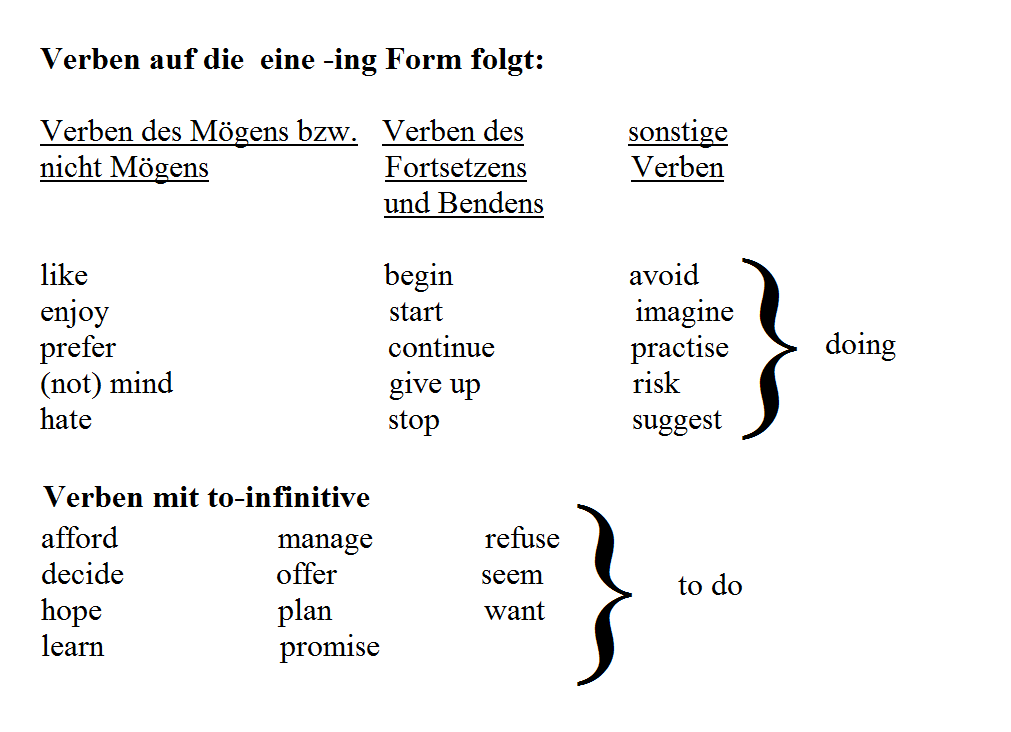exercises and solutions difference gerund to-infintive
Quiz-summary
- 1
- 2
- 3
- 4
- 5
Information
Exercises and solutions according to the to-infinitive, gerund
Results
Categories
- Not categorized 0%
- 1
- 2
- 3
- 4
- 5
- Answered
- Review
-
Question 1 of 5 1.
Question Sort the elements to form meaningful sentences.
Sort elements
- taking big risk.
- to do it himself.
- to clean up her room.
- smoking.
- getting up in the morning.
-
I always avoid
-
He managed
-
She offered
-
I gave up
-
They hate
-
Question 2 of 5 2.
Question Complete the sentences by the verb in brackets: -ing form or the to-infinitive:
example:
I don’t like_______. (get up) – I don’t like getting up.
I can’t afford______this customer. (lose) – I can’t afford to lose this customer.-
Can you imagine (being) rich. (be)
I mangaged (to do) it alone. (do)
I try to avoid (seeing) my boss. (see)
He offered (to help). (help)
We can't afford (to lose) another match. (lose)
He refused (to sit) next to her. (sit)
She suggested (doing) it tomorrow. (do)
I practised (singing) this song forever. (sing)
They promised (to come). (come)
He planned (to travel) to Italy. (travel)
Would you mind not (smoking)? (smoke)
-
Can you imagine (being) rich. (be)
-
Question 3 of 5 3.
Question Match the elements to meaningful sentences:
Sort elements
- to seeing my girlfriend.
- moving to her aunt.
- leaving his company.
- buying myself some ice-cream.
- moving to Greece.
-
I am looking forward
-
She is talking about
-
He worries about
-
I feel like
-
They are against
Hint
verschieden feststehende Ausdrücke mit Präspositionen
verlangen die -ing form:apologize for doing something, look forward to doing something
be against doing something, speak about doing something
be used to doing something, talk about doing something
be worth doing something, thank somebody for doing something
concentrate on doing something, think about doing something
dream of doing something, feel like doing something
worry about doing something -
Question 4 of 5 4.
Question Fill in the correct prepositions:
-
I am looking forward (to) seeing my uncle.
We're talking (about) doing it totally different.
She thanked him (for) being a gentleman.
He concentrated (on) working out a plan.
She worried (about) losing her boyfriend.
We apologize (for) being late.
He is used (to) being listened to.
She feels (like) buying an ice cream.
Hint
verschieden feststehende Ausdrücke mit Präspositionen
verlangen die -ing form:apologize for doing something, look forward to doing something
be against doing something, speak about doing something
be used to doing something, talk about doing something
be worth doing something, thank somebody for doing something
concentrate on doing something, think about doing something
dream of doing something, feel like doing something
worry about doing something -
I am looking forward (to) seeing my uncle.
-
Question 5 of 5 5.
Question Fill in either -ing form or to infinitve according to context:
-
He stopped (to buy) some cigarettes. (buy)
Go on (reading) text. You were interrupted.(read)
The lesson is over. Go on (to do) your homework.(do)
He stopped (smoking) completely.(smoke)
Never forget (to switch off) the light.(switch off)
I will never forget (kissing) my husband for the first time.(kiss)
I regret not (having worked, working) harder.(work)
I regret (to tell) you that you are fired.(tell)
I tried (taking) Aspirin, but it doesn't help. (take)
Hint
Einige Verben wechseln zwischen -ing form and to-infinitive
je nach Zusammenhang, wobei sich deren die Bedeutung ändert:to stop to smoke
for a break
stop smoking
quit smoking comletelynot to forget to do something
as a
reminder
I will never forget kissing my girlfriend for the first time.
memoryHe tried to phone you.
one time
He tried giving up smoking.
several attemptsI regret to inform you.
to regret in context of a certain occasion
I regret not studying.
regretting something generallygo on to read the text
earlier you did something elsego on reading the text
continue (you were just reading the text)
-
He stopped (to buy) some cigarettes. (buy)
gerund - to infinitive - difference
The difference between the gerund and the to-infinitive is not always easy. The problem is that there are only a few rules, but for the most part you will have learn the expressions by heart.




